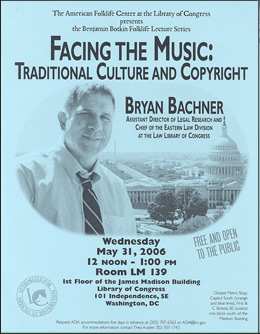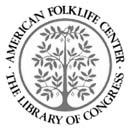| |
|||
|
The American Folklife Center at the Library of Congress
|

|
To what extent should copyright law protect the use and exploitation of traditional culture belonging to indigenous communities? Judges in the United States, and many lawmakers of the World Trade Organization, consider traditional culture part of the public domain.As a result, musical composers are largely free to incorporate traditional tunes into compositions, without either recognition or economic compensation.
The purpose of US copyright law, and the copyright framework embodied in the World Trade Organization’s Agreement on the Trade Related Aspects of Intellectual Property, is to promote the creativity of authors through recognition of their work. Such laws presume that a single author merits exclusive rights over the copyright work because it is only through an author’s individual genius that a copyrightable work can be created. The theory is that by providing an economic incentive to authors, the legal regime will nurture the creative process. A corollary assumption is that the absence of any reward for the creative effort would undermine the creative process. The copyright law formalizes this theory by regulating the definition, ownership and permissible uses of individual works. Copyright law affords to the author of a work the right to reproduce, distribute, perform, display or make derivative works from the copyrighted work. Infringement actions arise where third parties make use of the work or copy a substantial part of the work without permission of the author.
Such a regime certainly encourages individual authors to create; however, it ignores very important components of the creative process. In particular, this model overlooks and, arguably, discriminates against the interests of the authors of indigenous or traditional musical works. For instance, copyright law asserts that a work must, in effect, be written down for it to be copyrightable; this works against traditional cultures that conventionally transmit their work orally. Likewise, a copyright law will only protect those works that were created after the law’s enactment; much traditional music, however, was created prior to the establishment of the laws and is therefore considered free for all to use.
Bryan Bachner, Ph.D., will present musical illustrations and discuss recent cases in South Africa and China that reveal how indigenous cultures are challenging the copyright law status quo and seeking recognition for their contributions to modern musical works. In South Africa the estate of a Zulu songwriter, Solomon Linda, has disputed the copyright claim of the owner of “The Lion Sleeps Tonight,” a song licensed by Disney Enterprises, Inc. and used extensively in film and the theater worldwide. The case was settled out of court with the copyright owner paying millions of dollars in royalties to the Linda family. In China, ethnomusicologist/composer Guo Song has clashed with an ethnic minority over the acknowledgment of the minority’s contribution to a copyright work. The Beijing Intermediate People’s Court ruled that Guo Song must recognize their musical contribution in all future publications associated with the song.
Cases such as these raise serious questions about the future creativity of the cultural industries. Why are authors of traditional music treated like second class cultural citizens compared with authors of other genres of music? What kind of moral integrity can a cultural business claim when it misappropriates the work of others? How many songs are traditional authors and/or custodians concealing from the modern music industry because of their knowledge that they have no leverage or control over the use of their songs? How significant is the loss suffered by culture generally and the musical industries specifically when the creation of traditional music dries up because there are no incentives for traditional musicians to continue to develop their music?
Bryan Bachner Assistant Director of Legal Research and Chief of the Eastern Law Division Law Library of Congress
Bryan Bachner was the first American to receive his Ph.D. in Law from Wuhan University in China. His dissertation focused on a parallel question in the field of patent law and its impact upon the development of traditional Chinese medicine. For the last 15 years, Dr. Bachner served as an Associate Professor of Law at the City University of Hong Kong. He served as the Chairman of the Board of Governors of the Friends of the Earth (HK) and has consulted for governments and multinational corporations in the Asian region. He is currently Assistant Director of Legal Research at the Law Library of Congress and chief of the Eastern Law Division that covers the Asia Pacific, Middle East and Africa. The Legal Research Directorate provides legal research and reference services to the United States Congress, executive agencies and the Supreme Court. Dr. Bachner’s viewpoints expressed in this presentation are his alone and do not necessarily reflect the opinions of the Library of Congress.
 The American Folklife Center was created by Congress in 1976 and placed at the Library of Congress to "preserve and present American Folklife" through programs of research, documentation, archival preservation, reference service, live performance, exhibition, public programs, and training. The Center includes the American Folklife Center Archive of folk culture, which was established in 1928 and is now one of the largest collections of ethnographic material from the United States and around the world. Please visit our web site.
The American Folklife Center was created by Congress in 1976 and placed at the Library of Congress to "preserve and present American Folklife" through programs of research, documentation, archival preservation, reference service, live performance, exhibition, public programs, and training. The Center includes the American Folklife Center Archive of folk culture, which was established in 1928 and is now one of the largest collections of ethnographic material from the United States and around the world. Please visit our web site.
| ||||
